
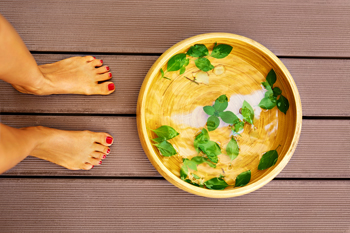
Our feet are often overlooked, but they play a critical role in our health and mobility, carrying us around throughout our lives. As we age, foot problems can intensify, potentially affecting our ability to live independently. The foot is a marvel of engineering, with 26 small bones intricately connected by ligaments, muscles, tendons, and cartilage. These components work in harmony to provide support and mobility. Neglecting foot health can lead to backaches, leg cramps, foot problems, and fatigue. To keep your feet in good condition, inspect them daily, moisturize dry skin, wear well-fitting shoes, exercise regularly, maintain proper hygiene, and trim your nails carefully. If foot problems, including athlete’s foot, corns, calluses, or ingrown toenails arise, it is important to get early treatment to avoid complications. Practicing a good foot care routine can help maintain healthy feet and put your best foot forward in life. If you would like to learn more about taking care of your feet, or if you encounter foot issues, it is suggested that you make an appointment with a podiatrist for further information and care.
Everyday foot care is very important to prevent infection and other foot ailments. If you need your feet checked, contact Dale Delaney, DPM from InStride Kinston Podiatry Center. Our doctor can provide the care you need to keep you pain-free and on your feet.
Everyday Foot Care
Often, people take care of their bodies, face and hair more so than they do for their feet. But the feet are a very important aspect of our bodies, and one that we should pay more attention to. Without our feet, we would not be able to perform most daily tasks.
It is best to check your feet regularly to make sure there are no new bruises or cuts that you may not have noticed before. For dry feet, moisturizer can easily be a remedy and can be applied as often as necessary to the affected areas. Wearing shoes that fit well can also help you maintain good foot health, as well as making it easier to walk and do daily activities without the stress or pain of ill-fitting shoes, high heels, or even flip flops. Wearing clean socks with closed shoes is important to ensure that sweat and bacteria do not accumulate within the shoe. Clean socks help to prevent Athlete’s foot, fungi problems, bad odors, and can absorb sweat.
If you have any questions please feel free to contact our office located in Kinston, NC . We offer the newest diagnostic and treatment technologies for all your foot and ankle needs.
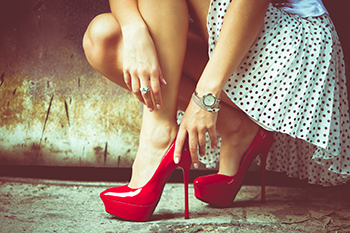
Wearing high heels may elevate your style, but they can also lead to a wide range of foot problems. These fashionable footwear choices, with their high heels and narrow toe boxes, can contribute to pain, discomfort, and potential health issues. One common problem is metatarsalgia, characterized by pain and inflammation in the ball of the foot due to increased pressure. In addition, high heels alter your posture, causing an increased load on the forefoot and reducing shock absorption. Another concern is the development of bunions. These painful, bony bumps can form at the base of the big toe as a result of the prolonged pressure and unnatural positioning of the foot in high heels. High heels also can lead to Achilles tendon issues, as the raising of the heel can cause the tendon to tighten and potentially result in tendonitis. To mitigate these problems, experts suggest limiting the amount of time high heels are worn as well as their height. Opt instead for shoes with lower heel heights, wide toe boxes, and cushioning insoles. If foot pain persists, it is suggested that you consult a podiatrist for personalized advice and treatment options if needed.
High heels have a history of causing foot and ankle problems. If you have any concerns about your feet or ankles, contact Dale Delaney, DPM from InStride Kinston Podiatry Center. Our doctor can provide the care you need to keep you pain-free and on your feet.
Effects of High Heels on the Feet
High heels are popular shoes among women because of their many styles and societal appeal. Despite this, high heels can still cause many health problems if worn too frequently.
Which Parts of My Body Will Be Affected by High Heels?
What Kinds of Foot Problems Can Develop from Wearing High Heels?
How Can I Still Wear High Heels and Maintain Foot Health?
If you want to wear high heeled shoes, make sure that you are not wearing them every day, as this will help prevent long term physical problems. Try wearing thicker heels as opposed to stilettos to distribute weight more evenly across the feet. Always make sure you are wearing the proper shoes for the right occasion, such as sneakers for exercising. If you walk to work, try carrying your heels with you and changing into them once you arrive at work. Adding inserts to your heels can help cushion your feet and absorb shock. Full foot inserts or metatarsal pads are available.
If you have any questions please feel free to contact our office located in Kinston, NC . We offer the newest diagnostic and treatment technologies for all your foot and ankle needs.
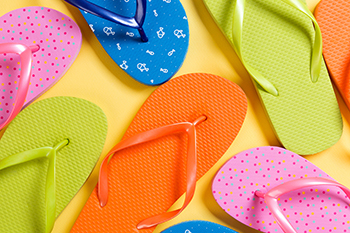
Flip-flops are a popular choice of footwear during the warm summer months, offering ease and convenience. However, beneath their casual appeal lies a hidden danger for your feet. One of the main issues with flip-flops is their lack of support and cushioning. Flip-flops provide minimal arch support, which can lead to foot conditions such as plantar fasciitis and flat feet. Additionally, the thin soles offer little protection from sharp objects or uneven surfaces, increasing the risk of foot injuries. The loose fitting design can cause the toes to grip onto the shoe, leading to toe pain and deformities that can include hammertoes. The constant flip-flop motion can strain the tendons and muscles in the feet and legs. To safeguard your foot health, it is best to limit flip-flop usage and choose more supportive footwear while walking long distances or engaging in physical activities. If you would like more information about how wearing flip-flops can affect your feet, it is suggested that you consult with a podiatrist who can provide you with the knowledge you are seeking.
Flip-flops can cause a lot of problems for your feet. If you have any concerns about your feet or ankles, contact Dale Delaney, DPM from InStride Kinston Podiatry Center. Our doctor will assist you with all of your foot and ankle needs.
Flip-Flops and Feet
Flip-flops have managed to become a summer essential for a lot of people. While the shoes may be stylish and easy to slip on and off, they can be dangerous to those who wear them too often. These shoes might protect you from fungal infections such as athlete’s foot, but they can also give you foot pain and sprained ankles if you trip while wearing them.
When Are They Okay to Wear?
Flip-flops should only be worn for very short periods of time. They can help protect your feet in places that are crawling with fungi, such as gym locker rooms. Athlete’s foot and plantar warts are two common fungi that flip-flops may help protect your feet against.
Why Are They Bad for My Feet?
These shoes do not offer any arch support, so they are not ideal for everyday use. They also do not provide shock absorption or heel cushioning which can be problematic for your feet. Additionally, you may suffer from glass cuts, puncture wounds, and stubbed toes since they offer little protection for your feet.
More Reasons Why They Are Bad for Your Feet
If you have any questions, please feel free to contact our office located in Kinston, NC . We offer the newest diagnostic and treatment technologies for all your foot care needs.
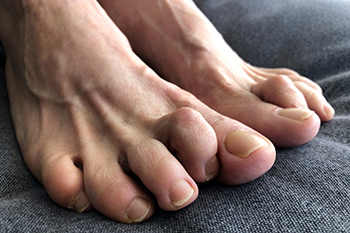
Hammertoe is a common foot condition that can happen from an imbalance of muscles surrounding the toe joints. Hammertoe can be categorized as classic hammertoe, mallet toe, and claw toe. In classic hammertoe, the affected toe will bend down at the joint and resemble a hammer. As toes are important to the balance of the foot and control pressure distribution, hammertoe can cause problems with walking. The affected toe can appear deformed, calluses can form on them, and it may be painful to wear shoes. Relief options for hammertoe pain can include choosing shoes with wide toe boxes, using toe pads, and wearing orthotics. If these conservative options are not successful and pain persists or worsens, surgery may be an option to straighten the toe. If you suffer from a painful hammertoe, it is suggested that you visit a podiatrist for an evaluation and to receive treatment that is personalized to your specific situation.
Hammertoes can be a painful condition to live with. For more information, contact Dale Delaney, DPM of InStride Kinston Podiatry Center. Our doctor will answer any of your foot- and ankle-related questions.
Hammertoe
Hammertoe is a foot deformity that occurs due to an imbalance in the muscles, tendons, or ligaments that normally hold the toe straight. It can be caused by the type of shoes you wear, your foot structure, trauma, and certain disease processes.
Symptoms
Risk Factors
Treatment
If you have hammertoe, you should change into a more comfortable shoe that provides enough room for your toes. Exercises such as picking up marbles may strengthen and stretch your toe muscles. Nevertheless, it is important to seek assistance from a podiatrist in order to determine the severity of your hammertoe and see which treatment option will work best for you.
If you have any questions, please feel free to contact our office located in Kinston, NC . We offer the newest diagnostic and treatment technologies for all your foot care needs.
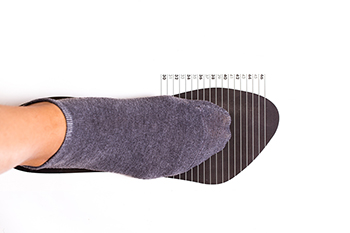
The importance of a proper shoe fitting can make a world of difference in foot comfort and health. Getting the right shoe size is like finding the perfect fit for a puzzle piece. Shoes that are too tight can cramp the toes and cause pain, while loose shoes can lead to blisters and discomfort. To find the ideal fit, measure the feet regularly as they can change as the body grows. It is beneficial to try on new shoes with the socks that will be worn to get an accurate feel. It is important to check that the heels do not slip and the arch of your foot aligns with the shoe's arch support. The feet are comfortable in shoes that fit properly right away. If you would like more information about how to measure for shoes that fit correcty, it is suggested that you speak with a podiatrist who can provide you with the knowledge you are seeking.
It is important to find shoes that fit you properly in order to avoid a variety of different foot problems. For more information about treatment, contact Dale Delaney, DPM from InStride Kinston Podiatry Center. Our doctor will treat your foot and ankle needs.
Proper Shoe Fitting
Shoes have many different functions. They cushion our body weight, protect our feet, and allow us to safely play sports. You should always make sure that the shoes you wear fit you properly in order to avoid injuries and deformities such as: bunions, corns, calluses, hammertoes, plantar fasciitis, stress fractures, and more. It is important to note that although a certain pair of shoes might be a great fit for someone else, that doesn’t mean they will be a great fit for you. This is why you should always try on shoes before buying them to make sure they are worth the investment. Typically, shoes need to be replaced ever six months to one year of regular use.
Tips for Proper Shoe Fitting
The shoes you buy should always feel as good as they look. Shoes that fit properly will last longer, feel better, and improve your way of life each day.
If you have any questions, please feel free to contact our office located in Kinston, NC . We offer the newest diagnostic and treatment technologies for all your foot care needs.